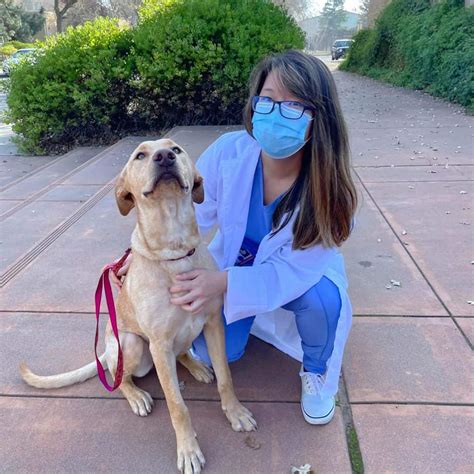Earning your veterinary degree from UC Davis, one of the top veterinary schools in the world, can open doors to a fulfilling career in animal health. However, getting accepted into this highly sought-after program is no easy feat, with an acceptance rate of only 12.3% for the 2023 entering class.

Understanding the UC Davis Vet School Acceptance Process
The UC Davis School of Veterinary Medicine employs a holistic review process, considering factors such as:
- Academic performance: GPA, GRE scores, science coursework
- Veterinary experience: Animal handling, veterinary shadowing, research
- Leadership and involvement: Extracurricular activities, community service
- Personal statement: Reflections on motivations and goals
- Letters of recommendation: Letters from veterinarians, professors, and others
Crafting a Standout Application
To increase your chances of acceptance, focus on the following:
Academic Excellence:
- Maintain a high GPA, particularly in science courses.
- Excel on the GRE, especially in the verbal and quantitative sections.
- Take advanced science coursework, such as biochemistry, microbiology, and physiology.
Relevant Veterinary Experience:
- Gain hands-on animal handling experience through internships or volunteering at animal shelters.
- Shadow veterinarians to observe their daily work and responsibilities.
- Participate in veterinary research projects to demonstrate your scientific abilities.
Leadership and Involvement:
- Engage in extracurricular activities that showcase your leadership skills and commitment to the community.
- Participate in veterinary-related clubs or organizations.
- Volunteer your time at animal welfare organizations or local veterinary clinics.
Compelling Personal Statement:
- Write a well-crafted personal statement that effectively conveys your motivations for pursuing veterinary medicine.
- Highlight your unique experiences and skills that make you a strong candidate.
- Proofread your statement carefully to ensure clarity and grammar.
Strong Letters of Recommendation:
- Request letters of recommendation from veterinarians who can attest to your veterinary knowledge and skills.
- Ask professors who have taught you in science or pre-veterinary courses to provide letters that highlight your academic abilities.
Competitive Statistics: A Look at the Numbers
The following statistics provide a snapshot of the competitive landscape at UC Davis:
| Year | Applications | Accepted | Acceptance Rate |
|---|---|---|---|
| 2023 | 1,286 | 159 | 12.3% |
| 2022 | 1,324 | 163 | 12.3% |
| 2021 | 1,407 | 148 | 10.5% |
Common Pain Points for Applicants
Applicants to UC Davis Vet School often face the following challenges:
- High competition due to the limited number of spots available.
- The need for a strong academic record and extensive veterinary experience.
- The competitive nature of the application process, including the personal statement and letters of recommendation.
- The financial burden of veterinary school, which can be significant.
Overcoming the Challenges: Strategies for Success
To overcome these challenges, consider the following strategies:
- Start early: Begin preparing for your application years in advance to gain the necessary experience and build your academic credentials.
- Network: Attend veterinary conferences and events to connect with professionals in the field.
- Seek guidance: Consult with a pre-veterinary advisor or mentor to provide guidance and support throughout the application process.
- Explore financial aid options: Investigate scholarships, grants, and loans to offset the cost of veterinary school.
- Stay motivated: Remember your passion for veterinary medicine and let it drive you through the application process.
Frequently Asked Questions (FAQs):
-
What is the average GPA of accepted students at UC Davis Vet School?
– The average GPA for the 2023 entering class was 3.85. -
What is the minimum GRE score required for UC Davis Vet School?
– There is no minimum GRE score, but competitive applicants typically score above the 50th percentile. -
How many hours of veterinary experience are required for UC Davis Vet School?
– While no specific number of hours is required, most successful applicants have at least 500-1000 hours of relevant experience. -
What is the cost of attendance at UC Davis Vet School?
– The estimated cost of attendance for the 2023-2024 academic year is $68,752 for California residents and $96,984 for non-residents. -
What is the average starting salary for veterinarians?
– According to the American Veterinary Medical Association, the median starting salary for veterinarians in 2022 was $100,370. -
What are the job prospects for veterinarians?
– The U.S. Bureau of Labor Statistics projects a 17% growth in veterinary jobs from 2021 to 2031, faster than the average growth for all occupations. -
What are the career options for veterinarians?
– Veterinarians can pursue a wide range of careers, including clinical practice, research, public health, and veterinary education. -
What is the difference between a DVM and a VMD?
– Both a DVM (Doctor of Veterinary Medicine) and a VMD (Veterinariae Medicinae Doctoris) are equivalent veterinary degrees. The main difference lies in the historical origins and terminology used in different regions.
